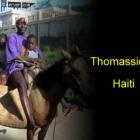ADVERTISEMENT
Slavery - Haiti Observer Blog
Slavery, Haiti Observer Blog. Read the following articles about Slavery
International Day for the Remembrance of the Slave Trade and its Abolition, Saint-Domingue
Hundreds of years of African slavery have been whittled down by most of the world as 'that thing most wished forgotten'. However, on Friday the 23rd of August, 2013, those who will never forget took the time to remember a past that still colors the present on the International Day for the Remembrance of the Slave Trade.
Imagining what months spent on board a rocking ship along the middle passage was like is thrown into sharp context when the diagram of the slave ship the Brookes is shown, and one is hard-pressed to remain unmoved when remembering the 142 thrown overboard to make way for water during the Zong massacre. However, as many focus on the tales of the horrors, the indignities and the atrocities that prevailed then, what should not be forgotten is the way in which the slave trade ended.
Frederick Douglass, a Friend to Haiti
Frederick Douglass, born into slavery in 1818, escaped his slave master and became a writer, speaker, and public servant. He was beaten from child- into early adulthood by his slave master. After one beating too many, he decided he was never going to tolerate another. When the slave owner tried to beat him, Frederick ferociously fought back.
By 1893, he was the leading black intellectual of his era, having penned many autobiographies detailing his life as a former slave. He put the lie to the argument slaves did not possess intelligence to lead their own lives with all the rights accorded to white citizens.
Haiti's Fraudulent Independence Debt
Although Haiti gained its independence from France and became the first black-led republic globally in 1804, foreign interests have continued to meddle in the island's affairs. France never forgave Haiti for defeating them and demanded 150 million francs as compensation for France's forfeiture of real estate and slaves. If Haiti didn't comply, France threatened to re-instate slavery.
Repayment of the debt ruined Haiti's economy, a major factor in its poorest-nation-in-the Western-Hemisphere status. Well over a century passed before Haiti cleared its debt to France in 1947. Millions upon millions of interest dollars protracted repayment to French banks, who lent Haiti money to pay off interest on the principal. In 1922, the U.S. assumed part of Haiti's debt that France had reduced to 90 million francs. In demanding compensatory damages, France violated its Declaration of the Rights of Man which states: "Men are born free and remain free and equal in rights."
Ile-a-Vache, Abraham Lincoln an Free American Slaves
Abraham Lincoln, before signing the Emancipation Proclamation, struck a deal with the landowner of Ile-à-Vache, a vacant island near the southern coast of Haiti. He contracted to send former slaves there to avoid racial uprisings on U.S. soil. The plan failed and Lincoln's decision has been debated by historians, trying to define his presidential character in the context of it. A perfect storm of disease, greed, and mistrust between government and private individuals brewed destructive forces, foiling a well-intentioned effort to deal with the aftermath of abolition in the U.S.
The ship traveling to Ile-à-Vache suffered an outbreak of smallpox en route. The 4,500 infected settlers were isolated, awaiting a second-supply ship that never arrived. This failure caused conflict to erupt between the landowner, his patrons, and agents of the U.S. government. The 500 unaffected settlers became stranded on Ile-à-Vache, and in rebellion ran the landowner off. Lincoln was forced to return the settlers to the U.S.
Toussaint L'Ouverture Machiavellian Ruler of Hispaniola
Toussaint L'Ouverture, born circa 1741, began life on a plantation in Saint-Domingue. In 1776 he became a freed slave. Once released from servitude, he acquired properties and became a rich man.
In 1791, he assumed a role as one of the military leaders of the Haitian slave revolt. He sought support from the Spanish in Santo Domingo, which sent provisions for his battles against the French. In a ruse, L'Ouverture co-opted the philosophy of the French Revolution, ingratiating himself with the government, influencing them to abolish slavery. By then the Spanish had become alarmed about L'Ouverture's assimilation of large tracts of land that threatened their sovereignty. These two events led L'Ouverture to switch alliances from the Spanish to the French.
Haiti Constitution of 1807
Title I. Abolishes slavery, grants residents full citizenship rights, protects property, and administers the death penalty for murder.
Title II. Sets up organization of government, appointing Henry Christophe President and Commander-in-Chief of the military. Empowers him to appoint his successor, sign treaties, and declare war.
Title III. Establishes Council of State and its functions under the President. Creates an Office of the Budget, presided over by a Budget Finance Director.
Title IV. Budget Finance Director shall also handle administration of Navy and Interior.
Title V. Creates a Secretary of State responsible for all intra- and inter-departmental correspondence, preparation of official government documents, and co-signatory duties.
1801 Constitution of Saint-Domingue, Haiti
The Constitution of Saint-Domingue Haiti was signed in 1801 by Governor-General for Life Toussaint L'Ouverture, the ruler of Hispaniola before Haiti became a republic.
Title I. Refers to the colony of Saint-Domingue, the seat of cities and neighboring islands, subject to French rule. Sets up the divisions of departments, arrondissements, and parishes.
Title II. Abolishes slavery, introduces anti-discrimination rules, and employment rights.
Title III. Establishes Christianity as the official religion of the colony. Forbids men of God from organizing for political reasons.
Title IV. Protects the legal rights of spouses as long as they remain faithful and their children born of their sanctified or civil union.
After Slave Revolution, Haiti now needs Business Revolution
Haiti is today standing at the crossroads. One path leads to complete humiliation and dependence on foreign countries and the other is of economic independence and sustainable growth. Several factors will together determine the fate of Haiti in the long run. Let us take a quick look at the aspects that can lead to development of Haitian economy.
• Haiti requires entrepreneurial revolution and for that the first step will be to build roads, improve electrical grids and develop other national infrastructure. Simultaneously, Haitians should be trained to maintain these new developments. Once the infrastructure is developed, the path for private investment opens up. This basic framework development is possible only with foreign aid. Haitian government on the other hand has to work closely with foreign investors and accept strict foreign vigilance at initial stages and prove that it is capable of managing FDI with minimum impact of corruption. The strict vigilance will gradually decrease and the government will have more flexibility to manage FDI that suits Haiti's needs.
The agricultural system of Kombit in Haiti
A well known staple of Haitian culture and society the Kombit system allows, through the collaborative effort of members of the community, the cashless exchange of agricultural goods and supplies. The emphasis of the concept is the sharing of products in a communal sense, not selling for profit. This way is not conducive to exportation, as most of the produced items are consumed within the area in which they are produced.
Ordinarily, a farmer will announce a planned Kombit day, selecting one fit for planting a specific crop. Invitations are extended to as many as he can support and tasks are meted out based on ability--with men responsible for digging and heavy lifting, and sex--with women and children doing easier work such as planting seeds. The work becomes an even greater benefit to the community with the unity it provides through the singing and joke telling that accompanies a Kombit. Participants are fed three meals for the day and share in the harvest they have helped to plan and plant.
Port-Margot, known for numerous rivers
The town of Borgne's other half in the Borgne Arrondissement located in the Nord Department is the municipality of Port-Margot. It is known for its numerous rivers, beautiful beaches, and mountainous geography. The municipality is composed of six sections, namely Bas-Petit, Bas-Quartier, Bras Gauche, Borgne Corail, Grande Plaine, and Haut Petit.
Port-Margot is home to about 37,000 Haitians who are mostly of Protestant faith. Most of them live a simple life, relying heavily on the municipality's many rivers for their livelihood. Rich vegetation is the most beneficial use of the rivers of Port-Margot, resulting to the heavy production cocoa and coffee. Historically, the municipality was Saint Dominque first French settlement. It is composed of several elementary schools and high schools, as well as a few health centres.
Our objective is to share with you news and information about Haiti and the people of Haiti. Traditions, habits and the way we were or grew are alive in this site. We highly recommend that you Subscribe to our Newsletter and also share with us some of the things that are memorable and made us unique people.

 Haitians are a Proud People
Haitians are a Proud People  Informative Marketing and Advertising in the Haitian Community
Informative Marketing and Advertising in the Haitian Community  Thomonde, Haiti
Thomonde, Haiti  Thomassique, Haiti
Thomassique, Haiti  Saint Marc, Haiti
Saint Marc, Haiti